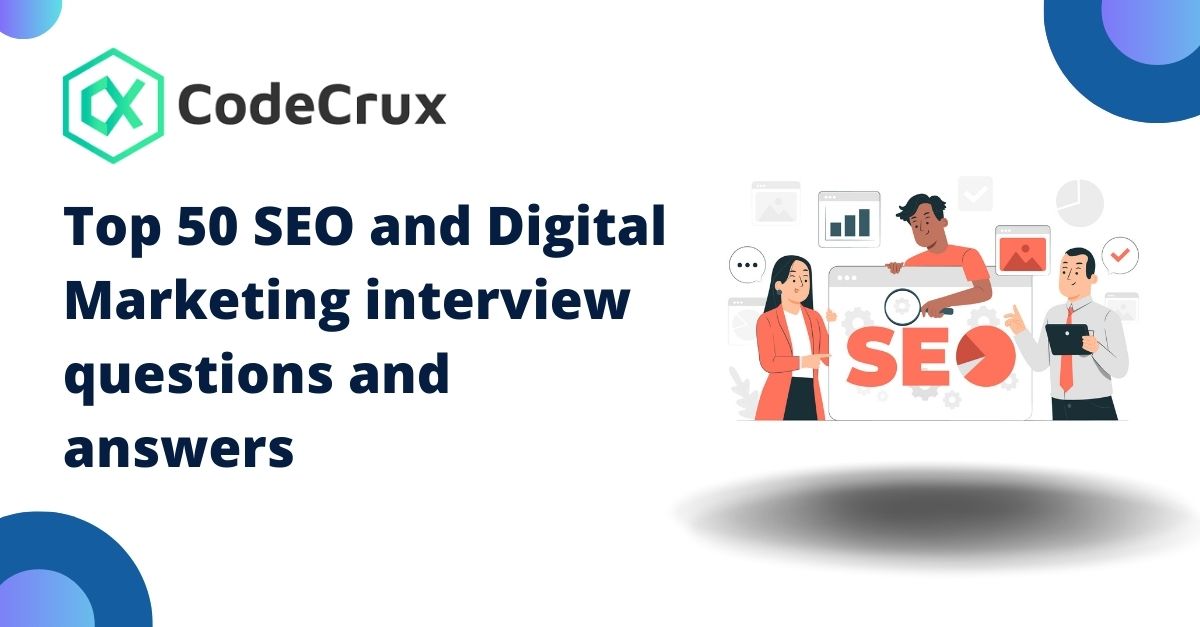Top 50 SEO and Digital Marketing interview questions and answers

Here are 50 SEO and Digital Marketing interview questions and answers, covering a mix of fundamental, technical, and advanced topics.
SEO Interview Questions
Basic SEO Questions
-
What is SEO, and why is it important?
SEO stands for Search Engine Optimization, a strategy to improve website visibility on search engines to drive organic traffic. - What are the types of SEO?
- On-Page SEO: Content optimization, meta tags, internal linking.
- Off-Page SEO: Link building, social sharing.
- Technical SEO: Sitemap, website speed, mobile-friendliness.
-
What is a keyword, and why is it important?
Keywords are the terms users type into search engines. Optimizing for relevant keywords increases your chances of ranking higher. -
What are backlinks?
Backlinks are incoming links from other websites. They boost credibility and SEO rankings. -
What is domain authority?
A metric developed by Moz to predict website ranking potential, scored from 1 to 100. -
What are long-tail keywords?
Specific phrases with lower search volume but higher conversion rates. -
What is a canonical tag?
It helps prevent duplicate content issues by specifying the primary version of a webpage. -
What is robots.txt?
A file that guides search engines on which pages to crawl or ignore. -
What is an XML sitemap?
A file listing website URLs to assist search engines in crawling. - What are meta tags?
- Meta Title: The clickable headline in SERPs.
- Meta Description: A short description shown under the title.
Advanced SEO Questions
-
What is schema markup?
Structured data that enhances SERP visibility with rich snippets. -
What is the importance of mobile-first indexing?
Google prioritizes the mobile version of websites for indexing and ranking. - How do you optimize page speed?
- Compress images.
- Minify CSS/JavaScript.
- Use CDNs.
- What is the difference between a dofollow and nofollow link?
- Dofollow: Passes link juice.
- Nofollow: Does not pass link juice.
-
What is bounce rate, and why is it important?
Percentage of visitors leaving a site after viewing one page. A high bounce rate may indicate poor user experience. - What are core web vitals?
Google’s metrics for measuring user experience:- LCP (Largest Contentful Paint).
- FID (First Input Delay).
- CLS (Cumulative Layout Shift).
-
What is black hat SEO?
Unethical SEO practices like keyword stuffing, cloaking, and link farming. -
What are rich snippets?
Enhanced search results with additional details like reviews, FAQs, or pricing. - How do search engines work?
- Crawling: Discovering content.
- Indexing: Storing content.
- Ranking: Ordering results.
- What is an organic search result?
Results generated based on relevance, not ads.
Digital Marketing Interview Questions
Basic Digital Marketing Questions
-
What is digital marketing?
Online strategies to promote products/services through channels like SEO, PPC, social media, and email. -
What is PPC?
Pay-per-click advertising where advertisers pay for each click. - What are the key digital marketing metrics?
- CTR (Click-through Rate).
- Conversion Rate.
- ROAS (Return on Ad Spend).
-
What is a marketing funnel?
The process customers go through, from awareness to conversion. -
What is remarketing?
Targeting users who previously interacted with your website or app. - What are the different types of online advertising?
- Search Ads.
- Display Ads.
- Social Media Ads.
-
What is a landing page?
A standalone page designed for conversions through specific CTAs. -
What is email marketing?
Sending targeted messages to prospects via email to nurture or convert them. -
What is affiliate marketing?
A performance-based strategy where affiliates earn commissions by promoting products. - What is content marketing?
Creating valuable content to attract, engage, and convert a target audience.
Advanced Digital Marketing Questions
-
What is the importance of A/B testing in digital marketing?
It helps compare variations of content to find what performs best. -
What are the benefits of programmatic advertising?
Automates ad buying, targeting specific demographics in real time. -
How do you measure campaign ROI?
[(Revenue - Cost) / Cost] × 100. -
What is Google Analytics?
A tool to track and report website traffic and user behavior. -
What is a buyer persona?
A semi-fictional representation of your ideal customer. -
What is influencer marketing?
Collaborating with influencers to promote products to their audience. -
What is social media engagement?
Interaction metrics like likes, shares, and comments. -
What is geotargeting?
Delivering content or ads based on a user’s geographic location. -
What is a chatbot?
AI-powered tools that simulate human conversations, often used for customer support. -
What is omnichannel marketing?
A cohesive approach across all marketing channels for a unified experience.
Scenario-Based Questions
-
How would you recover from a Google penalty?
Identify the issue (e.g., backlinks, duplicate content), rectify it, and submit a reconsideration request. -
How do you approach keyword research?
Tools: Google Keyword Planner, SEMrush, Ahrefs. Steps: Analyze competitors, prioritize long-tail keywords. -
How do you optimize for voice search?
Use conversational queries, focus on featured snippets, and improve local SEO. -
How do you handle negative feedback online?
Respond politely, resolve the issue, and encourage satisfied customers to leave positive reviews. -
How do you prioritize tasks in a digital marketing campaign?
Based on impact, urgency, and alignment with business goals.
Other Key Questions
-
What are the latest SEO trends?
AI-powered search (e.g., Google Bard), video SEO, E-E-A-T content (Experience, Expertise, Authoritativeness, Trustworthiness). -
What are the biggest challenges in digital marketing?
Ad fatigue, data privacy laws, algorithm changes, and competition. -
How do you create a content strategy?
Research audience needs, define goals, create a content calendar, and analyze performance. -
How do you optimize for local SEO?
Claim Google My Business, optimize for location-specific keywords, and encourage reviews. -
What is your approach to handling ad budgets?
Analyze past performance, allocate funds to high-performing channels, and adjust based on real-time data.
These questions prepare candidates to showcase both theoretical knowledge and practical expertise.